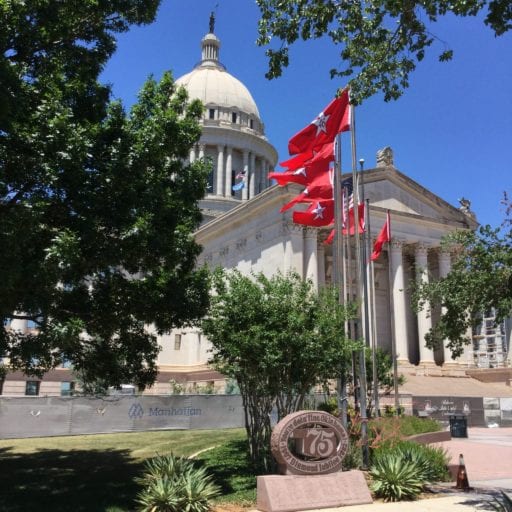BY DAVID PERRYMAN
 News of this week’s special legislative session has bumped up the number of calls and emails that I receive from constituents regarding their thoughts on Oklahoma’s impending revenue failure. As always, I encourage that input as it is important to me for my understanding and it is important for me to have real life examples to use as I attempt to persuade politicians whose lives exist in the bubble of the state Capitol and don’t understand how votes on bills can detrimentally impact hundreds of thousands of Oklahomans, young and old.
News of this week’s special legislative session has bumped up the number of calls and emails that I receive from constituents regarding their thoughts on Oklahoma’s impending revenue failure. As always, I encourage that input as it is important to me for my understanding and it is important for me to have real life examples to use as I attempt to persuade politicians whose lives exist in the bubble of the state Capitol and don’t understand how votes on bills can detrimentally impact hundreds of thousands of Oklahomans, young and old.
While the official reason that a special session has been called is to “replace the $215 million” hole that will result from the cigarette fee being held unconstitutional, the real impact is nearly half a billion dollars when the loss of federal matching dollars is considered.
However, even that $500 million hole does not address the hundreds of millions of dollars that have been diverted from roads, bridges, mental health, education or a number of other core services that have been crippled by unwise legislative decisions over the past 10 years.
As we look at revenue options, there are two groups who continually push back. There is the group that claims that the state’s budget could be balanced by diverting $102.7 million in county road funds, eliminating all funding to OETA, pulling $23 million from the Rainy Day Fund, using $83 million in “anticipated surplus cash.” The other group simply wants to pass the cigarette tax.
Neither group wants to address the ongoing cuts that undermine Oklahoma’s educational system, our mental health care, roads and bridges and the myriad of other state services that have been eliminated or reduced to a level of impotence.
Both groups however tout the wisdom of the tax policy of the state of Texas and covet the services that the Lone Star State provides to its citizens. Repeatedly, they point out that Texas has no income tax and erroneously state that it does not impose a sales tax.
The phenomenon of unwise fiscal decisions based on covetousness has many names. Nineteenth Century economist Thorstein Veblin called it “Conspicuous Consumption.” An early 20th Century comic strip called it “Keeping up with the Joneses.”
In Oklahoma it would be correct to call it “Keeping up with the Texans” and it is alive and well at the Capitol as those who hold a supermajority in both houses of the Oklahoma Legislature have been on a decade long pursuit to eliminate Oklahoma’s income taxes while pandering to the dictates of the oil and gas industry in the slashing of Oklahoma’s oil and gas production tax.
What they don’t acknowledge is that the “nice things” in Texas cost money and that the tax burden on Texans is higher than the tax burden on Oklahomans. In fact, Oklahoma’s Tax Freedom Day is a full six days earlier than our Texas cousins’. Only seven states tax its citizens less than Oklahoma [four of those seven are in the Deep South and have schools are only marginally better funded than Oklahoma’s].
It is no surprise that a state can have better roads and bridges and pay their teachers 20% to 30% higher wages when its tax structure produces revenues to fund those services. For instance, according to the State Business Tax Climate Index of the non-profit Tax Foundation, the corporate tax in Texas was second highest in the country while Oklahoma’s was ninth lowest. Oklahoma ranked lowest in the nation in the unemployment insurance tax while Texas was 11 spaces behind.
According to the Tax Foundation, Texas’ Property Tax was 13th highest in the nation while Oklahoma’s was 12th lowest. That often equates to an annual tax bill that is two to three times higher than an equivalent property in Oklahoma and clarifies why more than 40% of Texas’ local and state taxes are derived from property tax while Oklahoma’s property tax structure results in only 17.5% of its total local and state revenues.
It is interesting to note that while Texas does not tax groceries, the state sales tax rate is 6.25% and applies to hundreds of goods and services that are not taxed in Oklahoma at Oklahoma’s state rate of 4.5%. The result is that in Texas approximately 36% of all state and local collections come from sales taxes while Oklahoma receives 33.3% of its state and local collections from that source.
Another area that Oklahoma has the lowest tax rate of any energy producing state in the country is the gross production tax on oil and gas. In 2014, GPT made up the following percentages of total revenue in these states: Alaska 72%; North Dakota 54%; Wyoming 39%; West Virginia 13%; Texas 11%; and Oklahoma 8%. GPT would be a good place to start if Oklahoma really wants to “keep up with its neighbors.”
– David Perryman, a Chickasha Democrat, represents District 56 in the Oklahoma House








